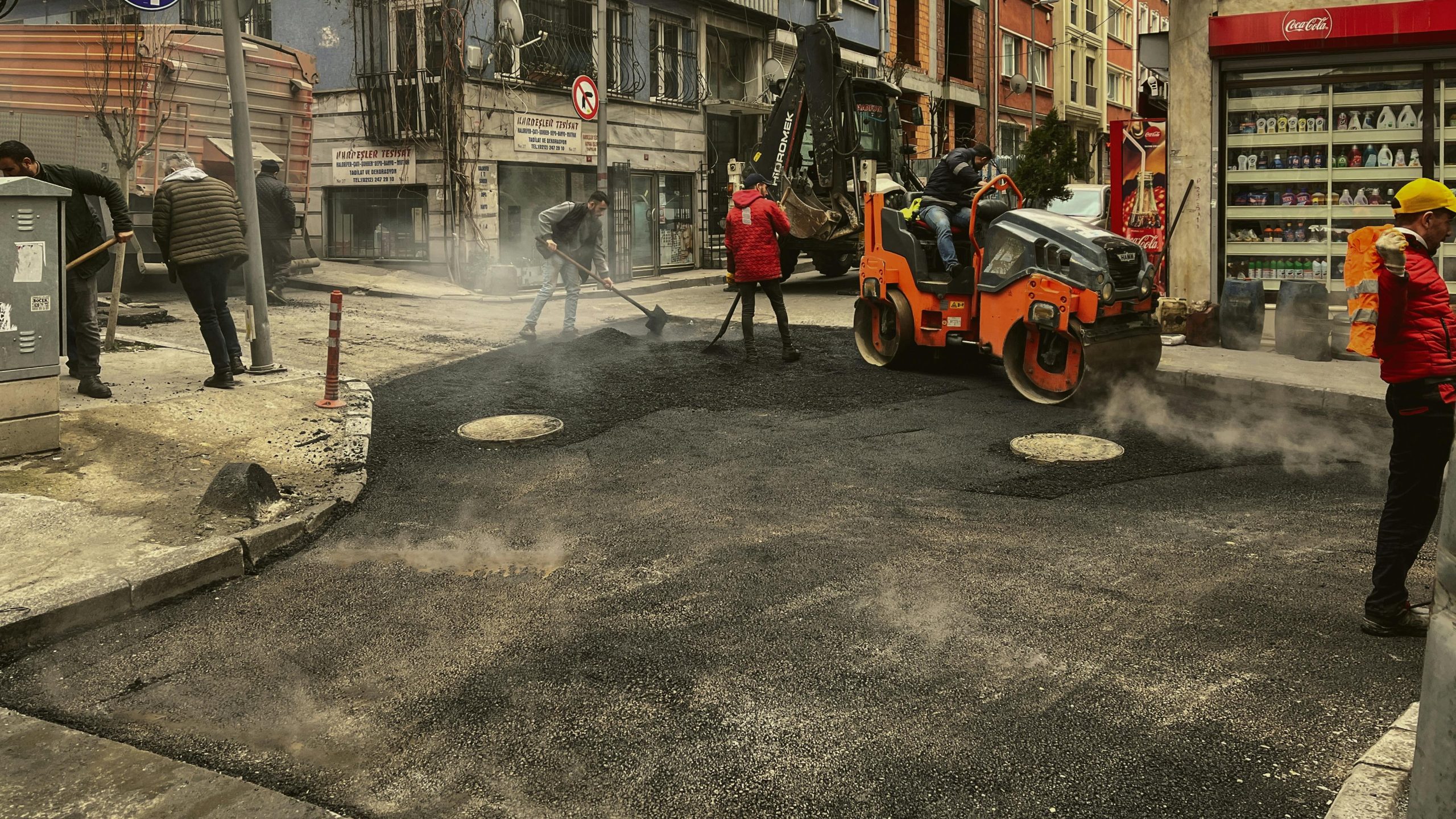Mastering NRSWA certification unlocks essential skills for safely carrying out streetworks across UK roads. Whether you’re an operative or supervisor, this comprehensive training ensures compliance with legal standards and enhances your qualifications. Find out how tailored courses, practical assessments, and flexible locations can help you secure your certification and advance your career in streetworks today.
Overview of NRSWA Streetworks Courses and Certification
Enrol in the NRSWA Course Today! is a key step for anyone involved in street infrastructure projects in the UK. The NRSWA Street Works Training Courses are mandated by legislation under the New Roads and Street Works Act (NRSWA) 1991. They ensure workers and supervisors are equipped with the knowledge and skills to carry out streetworks safely and compliantly.
Additional reading : Elevate your outdoors with expert garden designers today
Whether you aim to become an operative, supervisor, or need to renew your certification, these courses cover essential units. The training encompasses practical skills like excavation, signing, lighting, guarding, and location of underground utilities. The qualification is recognized by industry bodies, including City and Guilds, and issued via robust certification schemes. Once completed, the certification remains valid for five years, emphasizing the importance of renewal through reassessment courses.
Available across numerous UK locations, NRSWA Street Works Training Courses are delivered by experienced trainers blending classroom sessions and practical activities. The courses are structured to be accessible, with weekday and weekend options, supporting diverse schedules and career progression.
Topic to read : Mastering subscription box fulfillment for seamless shipping
Candidates can concurrently hold operative and supervisor qualifications, enabling flexible work roles, though they cannot serve both functions simultaneously on the same site. Registration processes are straightforward, and the courses include all fees exam, registration, and certification ensuring transparency.
This comprehensive training fosters compliance with legal requirements and enhances workforce capability, leading to safer streets and more professional streetworks operations.
Understanding the NRSWA Course Structure and Modules
The structure of NRSWA streetworks training is regulated to ensure every operative and supervisor receives robust and compliant instruction. The training divides participants into two core categories: operatives and supervisors, each following a detailed, unit-based syllabus.
Detailed Breakdown of Units
For operatives, the course covers units O1 to O8 alongside the LA unit:
- O1 (Signing, Lighting & Guarding): Establishes streetworks safety guidelines for temporary road layouts and public warning systems.
- O2 (Excavation): Focuses on methods for safe and effective ground breaking, considering on-site streetworks procedures.
- O3 (Reinstatement of Compacted Materials), O4 (Bituminous Materials), O5 (Modular Surfaces), and O6-O8: Introduce practical skills in reinstating various surfaces, an integral part of streetworks operative certification.
- LA (Location and Avoidance of Underground Apparatus): Empowers operatives with streetworks risk assessment techniques by teaching the use of Cat & Genny and map reading for underground utilities.
For supervisors, modules mirror these practical activities but emphasize monitoring and quality assurance instead of direct execution:
- S1-S7 and LA: Supervisors oversee compliance, enforce streetworks health and safety standards, and ensure operative responsibilities on site are met. This supports the overarching role of a streetworks supervisor by embedding leadership in daily operations.
Core Practical Skills in Streetworks Courses
Practical skills within NRSWA streetworks training include:
- Excavation and reinstatement of both flexible (bituminous) and rigid (concrete, modular) roads.
- Signing, lighting, and guarding of sites to align with legal requirements.
- Underground apparatus location using industry-standard equipment, crucial for minimising utility damage and promoting safe practices.
- Emphasis on streetworks traffic management training—ensuring safe public passage and clear on-site delineation, a foundational skill for both operative and supervisor roles.
These components of the streetworks course syllabus overview are delivered via hands-on methods, maintaining a strict focus on both legal compliance and the operational best practices needed for real worksites.
Alignment With Legal Standards and Industry Practice
Each unit aligns explicitly with the New Roads and Street Works Act, embedding streetworks legislation compliance directly into day-to-day training. Operatives and supervisors are assessed through a combination of practical demonstration, scenario-based learning, and online examinations. This structure ensures that only those with proven competence—demonstrated through meeting mandatory NRSWA course modules—acquire streetworks operative certification or streetworks supervisor qualification.
Further, the system of certification, assessment, and renewal (valid for five years) supports long-term compliance with evolving streetworks legal requirements. The regular reassessment and clear documentation also facilitate ease of verification during streetworks compliance inspections or audits.
In summary, this rigorously defined training pathway, delivered through experienced instructors, aims to raise the bar for safety, competence, and professional pride across the sector—benefiting those enrolling in NRSWA approved courses and anyone interacting with UK roads.
Course Delivery, Locations, and Enrollment Process
NRSWA streetworks training is delivered nationwide, ensuring wide accessibility for those pursuing streetworks operative certification and streetworks supervisor qualification. Training locations span across major cities including London, Birmingham, Derby, Nottingham, Berkshire, Leicester, Loughborough, Maidenhead, and beyond. This widespread geographical coverage ensures candidates can enroll in NRSWA approved courses close to where they live or work, facilitating easier access and reduced travel time.
Training Formats and Course Structure
The delivery formats for NRSWA streetworks training are designed for flexibility and practical relevance. Candidates have the option to attend classroom-based learning, participate in essential practical skills in streetworks training, and sit online assessments where permitted. The streetworks course syllabus overview covers both theory and practice, integrating streetworks safety guidelines throughout. Classroom sessions provide the legal and technical foundation, while hands-on training modules reinforce understanding of streetworks health and safety standards and enable direct application under supervision.
Practical sessions are especially valuable for mastering mandatory NRSWA course modules such as signing, lighting, guarding, excavation, and reinstatement. Whether enrolling for a full operative or supervisor programme, or pursuing a refresher, each candidate receives tailored instruction aligned to their chosen pathway. The role of a streetworks supervisor, for instance, is supported by dedicated training on compliance, planning, and workforce management, providing clear distinctions from operative responsibilities on site.
Step-by-Step Enrollment Guide
The NRSWA course registration process is streamlined to accommodate both individuals and groups. Registration typically begins with selecting your preferred location and the specific type of streetworks training—operative, supervisor, reassessment, or specialist single-unit courses. After choosing your course, you select available dates that fit your schedule, with sessions running on weekdays and weekends to support different shift patterns.
To secure your place, you complete an online registration form and submit payment—all training course fees cover tuition, assessment, and certification costs. No surprise add-ons are involved, ensuring transparency. Enrollment deadlines for streetworks courses are published for each location and course format, so early registration is advised to guarantee availability, especially for courses with limited spaces or high demand.
Recognised NRSWA training providers also assist with bespoke group bookings, catering to companies seeking on-site streetworks procedures and workforce safety development. For those with specific support needs, such as assistance with assessments due to dyslexia, reasonable adjustments can be arranged during enrollment.
Accessibility, Support, and Flexibility
Experienced staff are available to answer streetworks course FAQs related to course content, eligibility, and certification validity and renewal. Support teams help prospective learners understand prerequisites, differences between operative and supervisor courses, and provide nrswa exam preparation tips tailored to the chosen certification path.
Regular course start dates ensure workforce development can be timed to organisational needs, and refresher options are available for those needing nrswa refresher courses before their streetworks ID expiry. With a structured nrswa training enrollment guide, candidates can confidently progress towards fully accredited streetworks course certificates, benefitting from best-in-class industry standards in streetworks.
Certification, Renewal, and Assessments
The path to achieving streetworks operative certification or streetworks supervisor qualification begins with a targeted enrolment in NRSWA approved courses. Immediately upon successful completion of the relevant course assessments—administered by accredited NRSWA accreditation bodies like CABWI, Lantra, or City & Guilds—candidates are awarded certificates for each unit passed. These certificates confirm mastery of the mandatory NRSWA course modules essential for safe and compliant streetworks practice. Certification is only issued once a candidate demonstrates competence in both theoretical and practical skills in streetworks training, including assessment of crucial units such as excavation, reinstatement, signing, lighting, and guarding.
Certification validity runs for five years. During this period, operatives and supervisors must observe streetworks safety guidelines and maintain up-to-date knowledge through ongoing hands-on training in streetworks courses. The unique photo ID card, registered on the Street Works Qualifications Register (SWQR), clearly lists the accredited units. This document provides the legal authority to undertake site responsibilities under the New Roads and Street Works Act, reinforcing both industry credibility and compliance with streetworks legal requirements.
To retain valid credentials and legal working status, renewal is essential before the certification expiry date. The NRSWA refresher courses (reassessment courses) are specifically designed for those whose qualifications are soon to lapse or have recently expired. Renewal involves a condensed reassessment of core modules and new regulatory updates—often with an emphasis on practical skills in streetworks training—ensuring operatives and supervisors remain equipped for modern worksite demands.
Timely renewal through these NRSWA refresher courses is not just a matter of professional routine—it is required to continue operating without interruption or having to repeat the full course. If an individual’s card expires, they lose their legal standing to work immediately, highlighting the importance of strict adherence to certification validity and renewal timeframes. Most NRSWA accreditation bodies allow reassessment within a defined period post-expiry, but missing this window necessitates a full course retake.
Every phase, from enrolling in NRSWA approved courses, undertaking hands-on training in streetworks courses, to completing renewal, is overseen by recognised NRSWA accreditation bodies. They ensure that each operative and supervisor meets the high standards outlined in the streetworks course syllabus overview. This structured lifecycle—certification, reassessment, and compliance—is at the heart of advancing safety and maintaining the impact of NRSWA certification on career progression within the streetworks sector.
Legal & Workplace Requirements for Streetworks Personnel
Mandatory Compliance with the Street Works Act
Strict streetworks legal requirements define how work on public roads must be conducted. The New Roads and Street Works Act (NRSWA) establishes clear obligations: every operative and supervisor must complete nrswa streetworks training and maintain current streetworks operative certification or streetworks supervisor qualification. This legal framework ensures only those with the correct certification can perform or oversee site activities. Without this, work on local authority roads is not legally permitted and both individuals and employers may face enforcement action.
Roles and Responsibilities: Operatives & Supervisors
The operative responsibilities on site span every hands-on task: from excavating, reinstating surfaces, and backfilling to following precise streetworks safety guidelines. Operators must master technical units such as signing, lighting, guarding, and underground utility detection, all covered within the standard streetworks course syllabus overview. In parallel, the role of a streetworks supervisor is equally vital—supervisors bear responsibility for planning work, monitoring safety, ensuring compliance with all legal mandates, and overseeing those carrying out the physical tasks. Supervisors cannot perform operative duties simultaneously, keeping the roles and lines of authority distinct and complying with streetworks legal requirements.
Record Keeping, Site Signage, and Safety Standards
Robust streetworks documentation and record keeping is not just procedural—it is a core part of legislation compliance. Operatives and supervisors must log attendance, qualifications, unit completion, daily risk assessments, and incident reports, each forming part of a site’s audit trail for regulators. Rigorous streetworks job site safety measures are enforced through mandatory site signage, clear identification of hazards, and compliance with industry standards in streetworks. Traffic management relies on adherence to a recognized streetworks traffic management training protocol, ensuring correct signage, barriers, and lighting are in place to protect the public and workforce.
Ongoing nrswa refresher courses and re-certification guarantee competencies stay current as regulations, equipment, and practical skills in streetworks training evolve. Certification validity and renewal must be managed proactively by both operatives and supervisors to remain on-site and avoid sanctions. Formal streetworks course assessment criteria—including written and practical exams—confirm understanding of site safety, legal frameworks, and operational best practices.
Through nrswa approved courses, accredited qualifications, and robust on-site procedures, streetworks personnel meet the legal demands of the sector and contribute to safe, efficient public infrastructure improvements.
Additional Training and Career Development Opportunities
Streetworks workforce development depends not only on initial accreditation, but also on structured routes for further learning. Beyond the standard NRSWA streetworks training, professionals can pursue advanced streetworks courses, NVQs, and sector-specific modules to deepen competencies. Completion of these higher-level courses supports mastery of both practical skills in streetworks training and new regulatory changes, helping individuals adapt to ongoing industry standards in streetworks.
Undertaking additional streetworks operative certification or a streetworks supervisor qualification enhances recognition and opens doors to career progression. Certification levels serve as proof of expertise, affirming both operative responsibilities on site and the role of a streetworks supervisor in monitoring safety and productivity. Enrolling in NRSWA approved courses tailored to your current qualifications ensures continuous adherence to streetworks safety guidelines, demonstrating commitment to best practices.
Ongoing learning forms the backbone of a resilient streetworks workforce development plan. NRSWA refresher courses are crucial for keeping operational knowledge up to date, particularly as streetworks health and safety standards evolve. Professional development opportunities—such as targeted traffic management sessions and refresher modules—allow certified individuals to retain competence. This approach not only maintains compliance with streetworks legal requirements but also underscores the organisation’s investment in workforce advancement.
The advantages of advanced and continued training extend beyond regulatory compliance. Industry recognition increases for those who master a broader streetworks course syllabus overview, as endorsed by nrswa accreditation bodies. Refresher and advanced courses also address the nrswa course registration process and provide nrswa exam preparation tips, a necessity for qualification renewal. For operatives and supervisors, regular updates to training keep streetworks workforce development in line with changing legislation, technology, and client expectations.
Ultimately, a focus on multifaceted professional development—incorporating learning beyond the basics—ensures a high standard of safety, teamwork, and technical knowledge. This combination is instrumental for effective performance in all streetworks roles and increases employability in a sector committed to ongoing improvement.
Cost Structure, Funding Options, and FAQs
NRSWA streetworks training fees are straightforward: all essential costs—exam, registration, and certification—are aggregated into the quoted price. There are no hidden extras. When enrolling in NRSWA approved courses, candidates secure their seat and receive access to both the theory and practical elements, with fees covering the entire journey through assessment and qualification.
Funding support may be accessible for some learners. Many employers sponsor staff attending streetworks operative certification or streetworks supervisor qualification courses. In certain regions, especially for workforce upskilling, local grants or government schemes can supplement the training course fees and funding options. Group bookings may also unlock reduced rates, especially for on-site delivery options.
Frequently asked questions arise when starting the NRSWA course registration process. First, the prerequisites are clear: there are no formal academic requirements for most operative and supervisor courses, although basic literacy and numeracy are needed due to the assessment formats. Duration is typically five days for both streetworks operatives and supervisors, including practical skills in streetworks training and comprehensive coverage of mandatory NRSWA course modules.
For individuals exploring career paths, the differences between operative and supervisor courses are directed by job roles: operatives perform hands-on work, while supervisors oversee project compliance and site standards—both play key roles in upholding streetworks safety guidelines and the broader streetworks health and safety standards. Certification validity and renewal are important – each qualification and its ID card are valid for five years, with NRSWA refresher courses and reassessments available for ongoing compliance.
Enrolment deadlines are determined by local course schedules; prompt booking is advised due to high demand and regulatory requirements. The impact of NRSWA certification on career progression is substantial, opening opportunities in local authority works or as part of utility contracting teams.
Practical questions about streetworks course syllabus overview, hands-on training in streetworks courses, and the role of a streetworks supervisor are addressed within all training sessions to ensure clarity before, during, and after course participation. For additional details, the dedicated support team assists with nuanced queries about nrswa exam preparation tips or bespoke learning needs, ensuring everyone’s pathway through training course fees and funding options is as clear as possible.
Comprehensive Overview of NRSWA Streetworks Training: Operative and Supervisor Pathways
Precision and compliance drive the effectiveness of NRSWA streetworks training. For everyone aiming to work on public highways, understanding the streetworks operative certification and the streetworks supervisor qualification is the foundation for safe, legal, and high-quality operations.
NRSWA Streetworks Training Structure
Streetworks operative certification is designed for those performing hands-on tasks. The course typically covers five days, blending classroom learning with hands-on site practice. The practical skills in streetworks training include excavation, backfilling, reinstatement, and the use of essential tools for setting up signage, lighting, and guarding. This hands-on component is critical to mastering both technical methods and procedural safety.
For supervisors, the streetworks supervisor qualification focuses on oversight, compliance, and team coordination. Supervisors complete a parallel five-day program centering on planning, monitoring, and ensuring adherence to streetworks safety guidelines. This covers risk assessments, on-site management, and upholding rigorous streetworks health and safety standards.
Both types attend mandatory NRSWA course modules, with operators and supervisors completing unit combinations that reflect their responsibilities. The streetworks course syllabus overview highlights units such as Unit O1/S1 (Signing, Lighting & Guarding) and Unit LA (locating underground utilities), plus job-specific modules tailored to excavation and reinstatement.
Key Responsibilities and Role Differentiation
Operative responsibilities on site involve carrying out the physical work—preparing, excavating, and making the environment secure through correct signage and safeguarding. Operatives engage in the actual excavation, utilities detection, reinstatement, and support compliant traffic flows, grounding all activities in robust streetworks traffic management training.
The role of a streetworks supervisor is to guarantee that operatives work within approved protocols. Supervisors must enforce streetworks safety guidelines, coordinate resources, document processes, and ensure regulations are strictly observed. Their training emphasises risk assessment, workflow monitoring, and employee support to uphold all aspects of streetworks health and safety standards.
Enrolling in NRSWA Approved Courses
Enrolling in NRSWA approved courses is a step-by-step process: select the operational or supervisory pathway, review course schedules (weekday or weekend options available), and submit the required documentation. Reputable centres facilitate a straightforward NRSWA course registration process, supporting participants through all formalities.
To keep certifications valid, professionals must complete NRSWA refresher courses before expiry. This continuous learning ensures ongoing compliance and up-to-date knowledge on the latest streetworks safety guidelines and industry best practices.
Benefits of NRSWA Certification
The benefits of NRSWA certification extend beyond mere compliance. Certified operatives and supervisors enhance workforce safety, reduce operational risks, and signal their commitment to quality standards. NRSWA qualifications are valued industry-wide and directly impact career progression—opening pathways to senior and specialised roles within streetworks, utility management, and urban infrastructure development.
Accredited certificates confirm that personnel have not only met legal and quality thresholds but also internalised the culture of safe, effective, and responsible streetworks operation.
Expert-led, location-flexible, and meticulously structured, NRSWA streetworks training equips every participant with the practical skills, legal backing, and professional credibility vital for success on UK roads.











